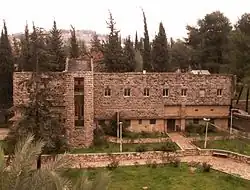Yeshivas Itri
Yeshivas Itri (Hebrew: ישיבת איתרי) is an Orthodox yeshiva in southeast Jerusalem. Founded in 1968 by Rabbi Mordechai Elefant, the yeshiva has several branches in Israel and the United States, and spawned several educational programs for Diaspora Jews.
| Yeshivas Itri | |
|---|---|
 | |
| Location | |
| Information | |
| Type | Yeshiva |
| Established | 1968 |
| Rosh yeshivas | Rabbi Yitzchak Bertler Rabbi Ariav Ozer |
| Affiliation | Orthodox |
Name
The name of the yeshiva is an acronym for Israel Torah Research Institute,[1]. From its founding, the yeshiva was officially called Yeshivas Midrash HaTalmud Tiferes Avraham – Itri (Yeshiva for the Study of the Talmud, Glory of Abraham – Itri). After the death of Elefant, its founder, in 2009, the name was changed to Yeshivas Midrash HaTalmud Zehav Mordechai – Itri (Yeshiva for the Study of the Talmud, Gold of Mordechai – Itri).
History
Yeshivas Itri was founded in 1968 by Elefant, an American-born educator who was a close student of Rabbis Aharon Kotler, Aryeh Leib Malin and Yitzchok Zev Soloveitchik.[2] He married the granddaughter of Yaakov Yosef Herman.[2] The initial student body comprised 60 kollel students,[2] but enrollment soon expanded with unmarried yeshiva students. The yeshiva met for several years in the Orient House hotel in East Jerusalem. Elefant moved it to the premises of an old British Mandate hospital in the southeast of the city, near the Arab village of Beit Safafa, in the 1970s. Students were housed in adjacent apartments.[2]
By 1971, enrollment was at 250 students, the majority from the United States.[3] The yeshiva received funding from the American Jewish Joint Distribution Committee,[3] government sources, and private donations.[4]
Over time, the institution grew to encompass a kollel, yeshiva gedola, yeshiva ketana, and Talmud Torah. Branches of the yeshiva were also opened in Hadera and in the United States.[2]
Fraud investigation
In 1999 yeshiva administrator Rabbi Chaim Weiss and businessman David Appel were suspected of embezzling NIS 9 million from yeshiva coffers during Elefant's medical leave.[4][5][6] The police investigation carried on for years; by 2014, police theorized that the stolen money was meant to pay for the defense of Aryeh Deri,[7] who was convicted on charges of fraud and bribery in 2000.[8]
Offshoots
Several educational programs for Diaspora Jews were spun off from Yeshivas Itri. They include:
- Yeshivat HaMivtar, founded in 1967 by alumnus Rabbi Chaim Brovender for English-speaking college-age students.[9]
- Yeshiva Shaar Hatorah, founded in 1974 in Queens, New York as a branch of Yeshivas Itri by Rabbis Kalman Epstein and Sholom Spitz.
- Shvut Ami Center for Russian Jews, founded in 1976 as a branch of Yeshivas Itri by Shimon Grilius, a former Prisoner of Zion; it later became an independent program.[10]
- Bruria (later Shappell's women's college), founded in 1976 by Rabbi Chaim Brovender as a spinoff of Yeshivas Itri's women's program.[9][11]
- Shapell's/Darche Noam (originally known as Hartman's), was a spinoff of the Yeshivas Itri program for English-speaking men.[9]
Faculty
Present
- Rabbi Ariav Ozer, rosh yeshiva
- Rabbi Meir Shimon Spitzer, Mashgiach
Kiryat Itri
Elefant founded the Kiryat Itri neighborhood in northern Jerusalem in 1967, the year before he established the yeshiva.[2] This Orthodox Jewish housing development, adjacent to Kiryat Mattersdorf and designed for 250 families,[17] was undertaken in cooperation with the Jewish Agency for Israel[18] to encourage American Jewish immigration to Israel.[19] Rabbi Nathan Kamenetsky, an instructor at Yeshivas Itri, lived in Kiryat Itri with his family.[19][20]
References
- Marwick, Lawrence (1979). Biblical and Judaic Acronyms. KTAV Publishing House, Inc. p. 95. ISBN 0870684388.
- Sever, Yechiel (12 November 2009). "NEWS: HaRav Mordechai Elefant zt"l". Dei'ah VeDibur. Retrieved 21 October 2015.
- "Visit to ITRI Yeshiva – Jerusalem" (PDF). American Jewish Joint Distribution Committee. 28 September 1971. Retrieved 21 October 2015.
- Izenberg, Dan (8 July 1999). "Elifant denies fleeing over Itri Yeshiva scandal". The Jerusalem Post. Archived from the original on 9 April 2016. Retrieved 21 October 2015.
- Kra, Baruch (6 August 2003). "Itri Yeshiva Boss Faces Indictment Over Missing Funds". Haaretz. Retrieved 22 October 2015.
- Dudkevitch, Margot (28 June 1999). "More Suspects to be Questioned in Itri Yeshiva Fraud Case". The Jerusalem Post. Retrieved 21 October 2015.
- Zvielli, Alexander (25 November 2014). "From Our Archives". The Jerusalem Post. Archived from the original on 17 April 2016. Retrieved 21 October 2015.
- Sontag, Deborah (4 September 2000). "In a Divided Israel, Thousands Rally for the Ex-Shas Party Leader as He Goes to Jail". The New York Times. Retrieved 22 October 2015.
- Zippor, Amihai (5 July 2007). "Learning Experience". The Jerusalem Post. Retrieved 21 October 2015.
- Rakeffet-Rothkoff, Aaron (2011). From Washington Avenue to Washington Street. Gefen Publishing House. p. 377. ISBN 978-9652299857.
- Furstenberg, Rochelle (1 May 2000). "The Flourishing of Higher Jewish Learning for Women". Jerusalem Center for Public Affairs. Retrieved 21 October 2015.
- Safier, Dovi (23 November 2021). "Blinded By His Glow". Mishpacha. Retrieved 17 April 2022.
- https://forum.otzar.org/viewtopic.php?t=46170&start=40
- https://www.theyeshivaworld.com/news/headlines-breaking-stories/208171/rabbi-asher-zelig-rubenstein-ztl-a-life-of-greatness-and-emunah.html
- https://forum.otzar.org/viewtopic.php?t=46170&start=40
- "Staff".
- "First Group of U.S. Jews Leaves for Israel to Settle in Orthodox Township". Jewish Telegraphic Agency. 27 August 1968. Retrieved 22 October 2015.
- Eldor, Rafael (7 September 1969). "אלפי עולים דתיים מארה"ב יבואו להתיישב בקריות הדתיות" [Thousands of Religious Immigrants from the United States Come to Settle in Religious Townships]. Maariv (in Hebrew). p. 17. Retrieved 22 October 2015.
- Goldstein, Dov (30 August 1968). "הרב אלפנט ו'העולים שלו'" [Rabbi Elefant and 'His Immigrants']. Maariv (in Hebrew). p. 15. Retrieved 22 October 2015.
- Litvak, Meir (2006). Middle Eastern Societies and the West: Accommodation or clash of civilizations?. The Moshe Dayan Center. p. 275. ISBN 9652240737.